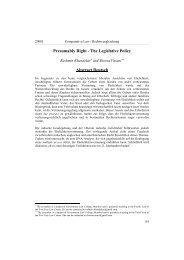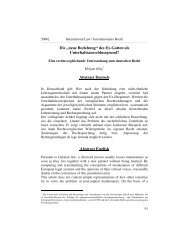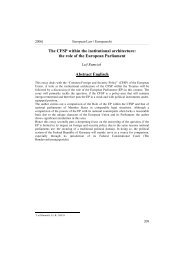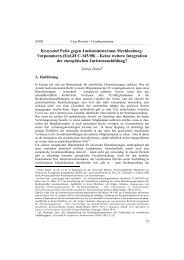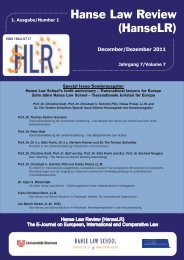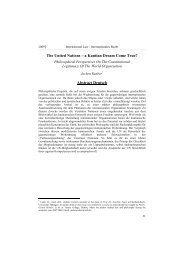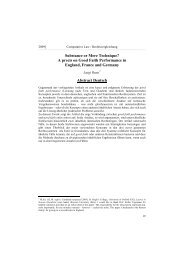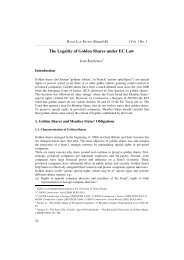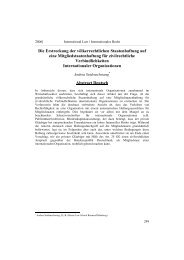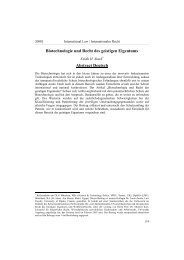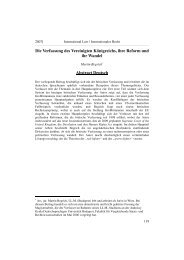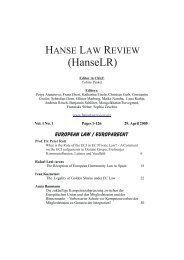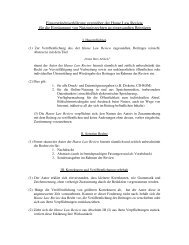The United Nations – a Kantian Dream Come True? - Hanse Law ...
The United Nations – a Kantian Dream Come True? - Hanse Law ...
The United Nations – a Kantian Dream Come True? - Hanse Law ...
You also want an ePaper? Increase the reach of your titles
YUMPU automatically turns print PDFs into web optimized ePapers that Google loves.
2009] International <strong>Law</strong> / Internationales Recht<br />
___________________________________________________________________________________________________________________________________________________<br />
d) Peace and Beyond <strong>–</strong> UN Charter Purposes and <strong>Kantian</strong> Criticism<br />
Yet, even if by far the most important purpose, 99 the establishment, preservation and<br />
development of world-wide peace is only one among the San Francisco objectives, the<br />
development of friendly relations among nations, the promotion of the economic and social<br />
advancement of all people, the achievement of international cooperation and the<br />
harmonisation of the actions of the signing nations setting up a periphery, which is open to<br />
criticism from a Perpetual Peace perspective. All of these purposes lack a corresponding<br />
legal-moral duty that would justify their implementation in a legal organisation as the<br />
<strong>United</strong> <strong>Nations</strong> Organisation, since for Kant they don’t seem to be essential to the<br />
preservation of peace. 100 Within the <strong>Kantian</strong> system of philosophy they form a part of the<br />
doctrine of virtue, but they do not belong to the doctrine of rights. All these purposes may<br />
hold moral value, but they are not part of the moral duties the performance of which<br />
peoples (or states) owe each other. This is nothing a person (or on an international level: a<br />
state) is entitled to. From a strict <strong>Kantian</strong> perspective these purposes are misplaced. Thus,<br />
the Charter advocates a positive notion of peace, but in doing so it exceeds the <strong>Kantian</strong><br />
conception. In the end however, this difference in objective comes down to a difference in<br />
judgment: If Kant had considered friendly relations to be essential for the preservation of<br />
peace, his theory would have known a corresponding legal duty. An assessment of the<br />
correctness of this judgment cannot be done here and is better left to a historical inquiry.<br />
2. Members<br />
Read in conjunction with the <strong>Kantian</strong> demand for a ‘federation of free states’, the first<br />
definitive article ‘<strong>The</strong> civil constitution of every state shall be republican’ 101 doesn’t only<br />
hold the criterion for inner state legitimacy but sketches out the internal composition of the<br />
<strong>Kantian</strong> world league. 102 If justice requires every state to be republican, contemporarily<br />
spoken: to have a representative democratic constitutional order, only a union of republics<br />
can be a just association of states. Hence, ‘the only just international arrangement is an<br />
alliance of liberal democracies’. 103 Accordingly, for reasons of justice and legitimacy, the<br />
members of the <strong>Kantian</strong> state federation are to be thought of as republican. 104 However,<br />
even from a non-normative perspective republicanism proves important to the <strong>Kantian</strong> state<br />
association, since it takes the single republic as a starting point, serving as a model for other<br />
states: ‘if by good fortune one powerful and enlightened nation can form a republic [...],<br />
this will provide a focal point for a federal association among other states. <strong>The</strong>se will join<br />
up with the first one, thus securing the freedom of each state in accordance with the idea of<br />
international right and the whole will gradually spread further and further by a series of<br />
alliances of this kind’. 105 So, over time more and more states will follow the model of the<br />
99 See, e.g. Wolfrum, ‘Art 1 UNC’, n. 14 who speaks of the maintenance of international peace and security as ‘the<br />
overarching purpose of the <strong>United</strong> <strong>Nations</strong>’.<br />
100 See for a broader argument Höffe, ‘Ausblick: Die Vereinten Nationen im Lichte Kants’, 257 ff.<br />
101 Kant, ‘Perpetual Peace’, 99.<br />
102 Tesón, ‘<strong>The</strong> <strong>Kantian</strong> <strong>The</strong>ory of International <strong>Law</strong>’, 60 ff.<br />
103 Tesón, ‘<strong>Kantian</strong> International Liberalism’, in Mapel, D. and Nardin, T. (eds), International Society <strong>–</strong> Diverse<br />
Ethical Perspectives (Princeton University Press, 1998), 101, 107 f.<br />
104 Habermas, ‘Kant's Idea of Perpetual Peace With the Benefit of Two Hundred Years' Hindsight’, 131; Höffe,<br />
‘Ausblick: Die Vereinten Nationen im Lichte Kants’, 248 ff., 254; Tesón, ‘<strong>Kantian</strong> International Liberalism’, 107.<br />
105 Kant, ‘Perpetual Peace’, 104.<br />
61



